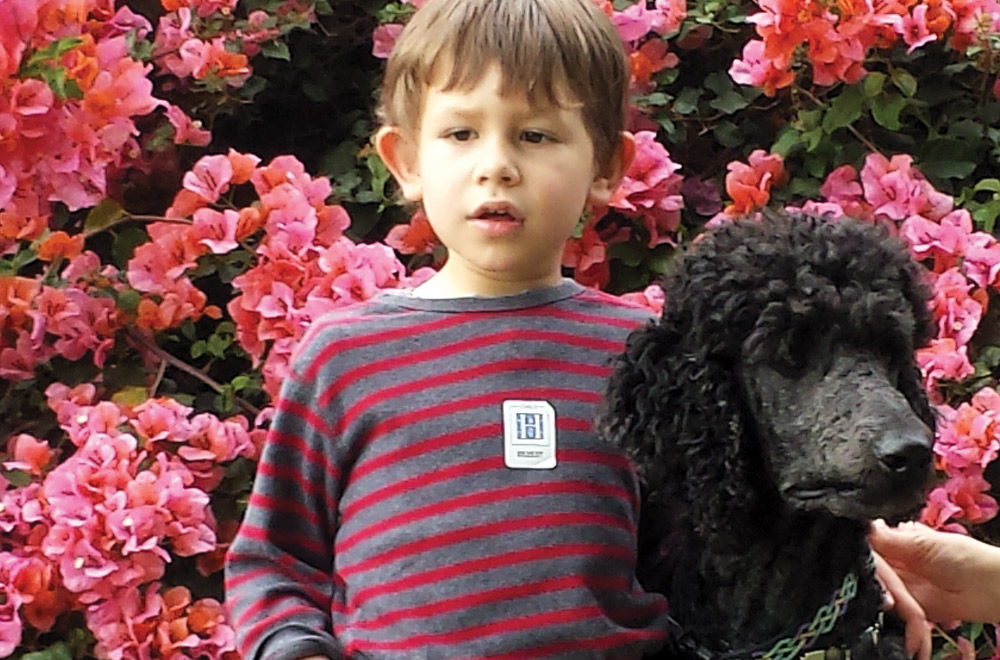Dogs specially trained to work with children on the autism spectrum have been successfully helping youngsters and their families cope with this difficult condition.
Anyone with a child who has been diagnosed with autism knows what a life-changing event it is. According to the Centers for Disease Control and Prevention, 1 in 68 children has autism spectrum disorder, so it’s an increasingly common condition. There are many ways to help these children with their development and day-to-day functioning, and among the more recent aids are service dogs that are trained specifically to work with autistic youngsters.
Wyatt and Jacques
When he was four years old, Andy and Lisa Bourne’s son Wyatt, who has autism, became a runner. Without warning, the little boy would speed off, sometimes entering dangerous situations. The Bournes knew they needed extra help with their active child, but were stymied about where to turn. Serendipitously, friends of the Bournes who also had an child with autism found help by acquiring a specially trained dog. Now, both at home and on outings, Wyatt enjoys the company of his own service dog, a standard poodle named Jacques. The two are tethered together by a leash that attaches to a belt around Wyatt’s waist, and to a special harness worn by Jacques.
“It not only prevents Wyatt from taking off, but having the dog there focuses him and keeps him grounded, because he has a job to do,” says Lisa. “We tell him to ‘walk your dog’, and that distracts him from engaging in the running behavior.” Wyatt seems to especially like being tethered to Jacques when walking uphill, as he has learned he can lean back on the tether and let his dog do most of the work.
“Most of our autism clients have children that are starting to take off and run away,” says Nicole Meadowcroft of Custom Canines Service Dog Academy in Madison, Wisconsin. “So they’re looking for some relief as well a safety component to any public outing they’re trying to go on. Most parents with ‘runners’ don’t leave the house as a family. They’re afraid the child is going to run off, or have a tantrum in the middle of the store and attract a lot of attention. To the parent, it just becomes easier to get a babysitter and go to the store alone — or to just not go anywhere.” This is where a service dog can really help.
Autism service dogs are a relatively new idea
The training of specialized service dogs for autistic individuals is a fairly new development. “Our organization started in 2007, and to date we have placed 80 dogs,” says Wade Beattie, founder of Autism Service Dogs in Ontario, Canada. “We mostly use retrievers, who are calm, patient and tolerant. It takes about 18 months to raise and train a dog to become an autism service dog.”
“The dogs are taught to react when a child gets overwhelmed by stimuli and begins to have a tantrum or engage in similar behavior, by nuzzling or even just putting a paw on the child,” says Nicole Meadowcroft of Custom Canines Service Dog Academy in Madison, Wisconsin. “The dogs are also trained to perform compression by becoming a ‘weighted blanket’, lying on the kids when they start to get upset. The kids who have had their dogs for a while will actually ask them to come lie across their laps, before they get to that point of acting out.”
The application process
For the family in need of the services of one of these highly trained dogs, the process begins with filling out an application with the organization, which then reviews the request. An in-home interview follows in order to assess the specific needs of the family, and to determine the appropriateness of a service dog for the individual and the household.
“When we interview a child/family for a service dog, we need to know the child will enjoy having a dog, that all signs suggest the child will be good with a dog, and whether the parents and we ourselves believe a dog will be of benefit to them,” says Wade. “If the child is aggressive towards animals or people, or doesn’t like or is extremely afraid of dogs, a placement will be deemed unsuitable.”
A “life-enhancing” experience
The phrase “life-enhancing” is frequently inserted into the conversation when discussing autism service dogs, whether you’re talking to trainers or clients. Lisa concurs that Jacques has immensely enhanced the lives of Wyatt and the family. “Just the fact that he notices the dog, calls him by name, talks about Jacques, and starts to think outside his world has been amazing in and of itself.
“When Wyatt gets upset and throws tantrums, it gets very dramatic,” Lisa adds. “Jacques will come to him and we give him the command ‘cuddle’ [lie across the child’s lap like a weighted blanket], but what Jacques has started doing is licking Wyatt’s face, kissing him and making him giggle. So during the tantrum, Wyatt will alternate between crying and laughing, until eventually Jacques takes him out of that moment by totally distracting him until he can’t be upset anymore. It’s amazing.” Lisa and Andy say that right from the start, Wyatt and Jacques formed a palpable, positive bond that was almost magical. “It was beautiful when Jacques entered our family.”
Learn more about autism service dogs
Assistance Dogs International (ADI), assistancedogsinternational.org
Autism Service Dogs, autismdogservices.ca
Custom Canines Service Dog Academy, customcanines.org








